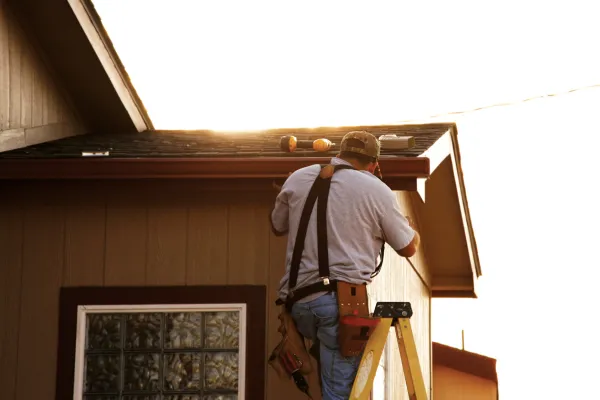Our Learning Center

10 Tips to Stay Safe While Caring for Your Roof
Your roof is a vital protective layer between your home and the elements. But roofs require care and maintenance which means homeowners need access this high-up space regularly. This exposes us to potential risks. Safety should always come first when inspecting, cleaning or doing minor repairs on your roof.
In this guide, we’ll cover smart practices for keeping yourself and others protected while taking good care of your roof as a homeowner.
Leave Major Work to the Pros
Extensive repairs, treatment applications or complex tasks like full roof tear-off and replacements are best left to trained professionals with the right safety equipment and expertise. Don’t put yourself in harm’s way attempting major roof work as a DIY project.
But some basic roof care and inspection can be safely managed if you prepare properly. Let’s go over prudent precautions.
Choose the Right Ladder
A sturdy, well-positioned ladder is essential for getting up and down the roof safely. Follow these tips:
Use a professionally-rated ladder designed for roof access. Look for ladders rated to hold your weight plus equipment.
Select an extension ladder tall enough to extend 3 feet above the roofline when positioned at a 75-degree angle.
Position the ladder on stable, level ground away from power lines, trees and other hazards.
Place ladder feet 1⁄4 of ladder height away from the home for optimal stability and strength.
Securely lock the ladder’s extenders and add rubber feet or shoes for grip.
Have a helper stabilize the ladder base when climbing. Never lean a ladder against roof gutters or edges which can bend and collapse.
Set Ladder at the Right Angle
Positioning the ladder at the proper angle prevents slipping and reduces strain. Follow the ‘4-to-1’ rule:
Place the ladder base 1 foot away from the house for every 4 feet of ladder height to the roof.
On a single-story home, if the roof is 12 feet high, the ladder base should be 3 feet from the house.
For a two-story home with a 24 foot roof height, place the ladder base 6 feet away.
This allows you to ascend and descend at a moderate backward angle, keeping the ladder stable.
Inspect the Roof Before Accessing

Scan the roof prior to getting up close for any trouble signs like:
Damaged or slippery areas to avoid
Debris that needs clearing
Areas that look unstable or rotted
Leaks, holes or loose material
Also check the weather forecast. Don’t attempt accessing the roof in wet, icy, windy or stormy conditions when it’s treacherous.
Wear Proper Gear
Wearing appropriate clothing and protective equipment helps prevent falls and injuries:
Secure, rubber-soled work shoes/boots with traction avoid slips and punctures.
Gloves improve your grip and protect hands from sharp debris.
Safety goggles shield eyes from dust and debris while working.
A headlamp frees up both hands for climbing and lets you see well.
Lightweight long sleeves and pants keep you covered.
Avoid wearing loose clothing or accessories that can get caught.
Wear an N95 facemask if removing asphalt, tile or debris that kicks up dust.
Attach Your Tools
Carrying tools up and down a ladder is challenging and risky. Instead:
Use a tool belt designed for roof work to keep materials secure.
Tie a rope around tools then hoist up once on the roof.
Place tools in a bucket that can be lifted up after accessing the roof.
Set up a slide system with a pulley and rope to transfer items from the ground.
Follow Safety Procedures On the Roof
Once on the roof, remain cautious:
Ensure roof anchors, harnesses and ropes are tight if using tethered safety equipment.
Check for loose or cracked shingles/tiles before proceeding.
Stand only on roof joists/trusses to distribute your weight. Walk heel-to-toe.
Avoid standing on slick spots, ridges or pitches over 45 degrees.
Minimize reaching too far upslope and maintain 3 points of contact for stability.
Slide materials instead of tossing them around or over the roof edge.
Remove debris by sliding or rolling it off roof slopes feet first.
Work extra carefully around skylights, vents and low roof edges.
Check your footing with every step on an unfamiliar roof.
Safely Descend and Clean Up
Follow proper protocol when finished:
Gather tools/materials and ensure nothing is left on the roof.
Clean debris from shoes before using ladder to avoid slips.
Climb down facing the house using the 3 point contact rule.
Remove the ladder when done to prevent others from unsafely accessing the roof.
Check for and remove any fallen debris around the house perimeter.
Remove safety gear like harnesses and wash up.
Avoid Risky Practices
Steer clear of several hazardous actions like:
Leaving tools and materials scattered on the roof.
Trying to move too quickly or skipping protective steps.
Assuming it’s safe to walk on certain roof sections without checking first. This can lead to accidents and falls.
Carrying heavy, bulky objects up ladders which affects balance and grip.
Accessing the roof in slippery conditions or poor visibility.
Wearing baggy clothing, jewelry or packs that can get caught on ladders or roofing.
Doing roof work alone with no ground spotters to get help if needed.
Get Help for Complex Tasks
For jobs like roof ventilation improvements, tall tree branch trimming, heavy debris removal, chimney repairs, dealing with steep pitches and similar chores, always consult a professional.
Certain maintenance is also best left to roofers with technical expertise like:
Resealing vents, skylights and flashing
Securing loose shingles/tiles
Complete gutter cleaning
Replacing deteriorated roof materials
Sealing asphalt shingle surfaces
Let us know if we can handle any roof maintenance or repairs for you! Staying safe comes first.
Protect Yourself and Your Home
While a roof protects your home, you need to protect yourself when working from this elevated space. Following prudent safety practices reduces the chance of injuries. We want every homeowner to avoid becoming a roof accident statistic.
By using sturdy ladders, wearing appropriate gear and taking it slowly, you can safely inspect and perform occasional light roof maintenance. But for substantial repairs or replacements, entrust your roof to the pros.
Contact Infinity Roofing Contractors for an evaluation of your roof. We’re happy to answer any roof safety questions as well. And we provide reliable maintenance, repairs and replacements to protect your most valuable asset - your home.
How can we help you today?
Our family is standing by to help yours.








